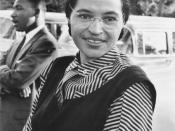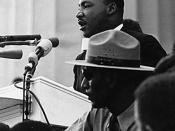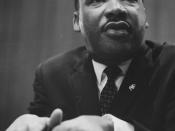This is a paper I wrote the night before it was due. I not only work well under pressure, but I only work under pressure. "Very polished. Good use of sentence structure. God citations."
'One of the world's best known advocates of non-violent social change strategies, Martin Luther King, Jr. synthesized ideas drawn from many different cultural traditions.' (Carson 1). However, these protest strategies only furthered racial segregation, resulting in the eventual death of King.
Michael King, who was later known as Martin Luther King, Jr. was born January 15, 1929, at 501 Auburn Avenue in Atlanta, Georgia. His roots were in the African-American Baptist church. After his junior year at Morehouse College, Benjamin Mays influenced him to become a minister, the president of Morehouse College. (Smith 1). He studied theologies at Crozer Theological Seminary in Chester, Pennsylvania, and at Boston University, where he earned a doctorate in systematic theologies in 1955.
(Carson 1). While he was completing his Ph. D. requirements, Martin Luther King, Jr. decided to return to the south. He became the pastor of Dextor Avenue Baptist Church in Montgomery, Alabama. (Smith 2).
Five days after Rosa Parks refused to obey the city's rules concerning bus segregation, African-American residents of Montgomery, Alabama launched a bus boycott. They elected Martin Luther King, Jr. as president of the Montgomery Improvement Association. (Phillips 3). King received national prominence as the boycott continued, due to his personal courage and exceptional oratical skills. (Carson 2).
On charges on conspiracy, Martin Luther King, they bombed Jr.'s house, and they arrested him along with other boycott leaders. (Mark 3). Despite these actions taken against the boycott, Montgomery buses were desegregated in December of 1956. The Supreme Court had declared Alabama's laws of segregation unconstitutional.
During 1957, Martin Luther King, Jr. and other African-American ministers...


